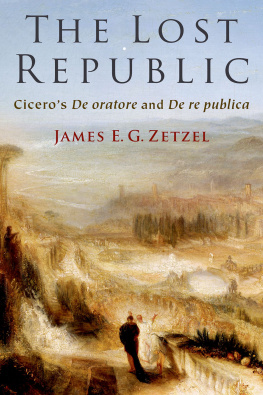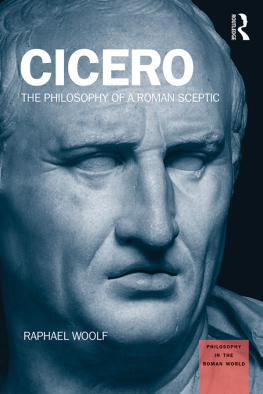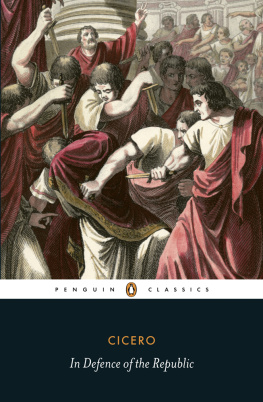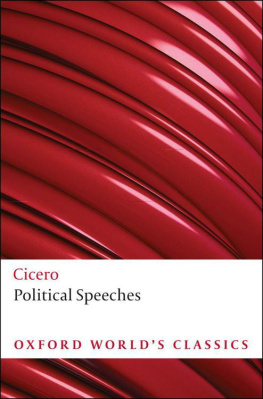STUDIES IN CLASSICS
edited by
Dirk Obbink
Oxford University
Andrew Dyck
The University of California, Los Angeles
A ROUTLEDGE SERIES
OTHER BOOKS IN THIS SERIES:
SINGULAR DEDICATIONS
Founders and Innovators of Private Cults in Classical Greece
Andrea L.Purvis
EMPEDOCLES
An Interpretation
Simon Trpanier
FOR SALVATION'S SAKE
Provincial Loyalty, Personal Religion, and Epigraphic Production in the Roman
and Late Antique Near East
Jason Moralee
APHRODITE AND EROS
The Development of Greek Erotic Mythology
Barbara Breitenberger
A LINGUISTIC COMMENTARY ON LIVIUS ANDRONICUS
Ivy Livingston
HYPERBOREANS
Myth and History in Celtic-Hellenic Contacts
Timothy P.Bridgman
RHETORIC IN CICERO'S
PRO BALBO
Kimberly Anne Barber
ROUTLEDGE
NEW YORK & LONDON
Published in 2004 by
Routledge
29 West 35th Street
New York, NY 10001
www.routledge-ny.com
Published in Great Britain by
Routledge
11 New Fetter Lane
London EC4P 4EE
www.routledge.co.uk
Copyright 2004by Taylor & Francis Books, Inc.
Routledge is an imprint of the Taylor & Francis Group.
This edition published in the Taylor & Francis e-Library, 2005.
To purchase your own copy of this or any of Taylor & Francis or Routledge's collection of
thousands of eBooks please go to www.eBookstore.tandf.co.uk
All rights reserved. No part of this book may be reprinted or reproduced or utilized in any form or by
any electronic, mechanical, or other means, now known or hereafter invented, including
photocopying and recording, or in any information storage or retrieval system, without written permission from the publishers.
Library of Congress Cataloging-in-Publication Data
Barber, Kimberly Anne, 1956
Rhetoric in Cicero's Pro Balbo/Kimberly Anne Barber.
p. cm. (Studies in classics; v. 6)
Includes bibliographical reference (p.) and index.
ISBN 0-415-96995-6 (alk. paper)
1. Cicero, Marcus Tullius. Pro Balbo. 2. Speeches, addresses, etc.,
LatinHistory and criticism. 3. Balbus, Lucius Cornelius. 4.
Rhetoric, Ancient. I. title. II. Series: Studies in classics (Routledge
(Firm)); v. 6.
PA6279.B33B37 2004
875. 01dc22 2003021586
ISBN 0-203-49766-X Master e-book ISBN
ISBN 0-203-58034-6 (Adobe eReader Format)
Series Editors Foreword
Studies in Classics aims to bring high-quality work by emerging scholars to the attention of a wider audience. Emphasizing the study of classical literature and history, these volumes contribute to the theoretical understanding of human culture and society over time. This series will offer an array of approaches to the study of Greek and Latin (including medieval and Neolatin), authors and their reception, canons, transmissions of texts, ideas, religion, history of scholarship, narrative, and the nature of evidence.
While the focus is on Mediterranean cultures of the Greco-Roman era, perspectives from other areas, cultural backgrounds, and eras are to be included as important means to the reconstruction of fragmentary evidence and the exploration of models. The series will reflect upon the role classical studies has played in humanistic endeavors from antiquity to the present, and explore select ways in which the discipline can bring both traditional scholarly tools and the experience of modernity to bear on questions and texts of enduring importance.
Dirk Obbink, Oxford University
Andrew Dyck, The University of California, Los Angeles
To the memory of my mother and father,
optimis parentibus,
and to Sylvanus.
Contents
Acknowledgments
I WOULD LIKE TO THANK THE UNIVERSITY OF TEXAS AND THE DEPARTMENT of Classics for financial support during my doctoral studies. I am also grateful to my readers, Professors David Armstrong, Michael Gagarin, James May, and Gwyn Morgan, all of whom contributed to this dissertation with their keen eye for detail and excellent suggestions. In particular, I would like to thank my co-supervisors, Professors Karl Galinsky and Andrew Riggsby, who in addition to offering a careful reading and invaluable advice, also encouraged me and shepherded this dissertation through to completion. I would also like to thank my editors, Dr. Andrew Dyck, for his careful reading and helpful suggestions, Mr. Paul Foster Johnson, for his patience and good humor, and Ms. Nathalie Martinez.
Introduction
AS CICERO'S FIRST EXTANT FORENSIC SPEECH AFTER LUCA, THE PRO BALBO was delivered during a momentous historical period in Rome.
Despite these factors scant scholarly attention has been directed towards the speech. In the last quarter of the 19th century and the early 20th century, only four important works were devoted to the Pro Balbo. Jullien's dissertation (1886) focuses on the life of Balbus and examines the circumstances surrounding the speech, although it does not tackle the speech itself. Gasquy (1886) addresses the historical and biographical circumstances surrounding the speech, and certain issues regarding citizenship and treaties. But his historical discussion of the speech itself is descriptive rather than analytical.
Kaden (1912) deals primarily with the life of Cornelius Balbus and the question of citizenship, saving a rhetorical and stylistic discussion of the speech for the last twelve pages. Here he breaks up the speech into its divisions according to traditional rules, justifies his divisions, since in some cases they differ from those of his predecessors, and outlines the contents of each part. He then adds a brief stylistic discussion of some tropes and figures contained in the speech. There is no attempt to examine each part for what it contributes to the whole or to analyze how the individual sections fit together, or in the stylistic portion, how style functions in relation to the rhetoric. Hoche's (1882) work deals mostly with Balbus life, but also divides the speech into its rhetorical parts, giving a synopsis of each. This study, like Kaden's, does not provide much rhetorical analysis. There are also two commentaries, but these are only slightly more helpful: one by J.S.Reid (1890), the other by Cousin (1962). Both provide useful biographical and historical background to the speech, and grammatical notes. Cousin's also has a thorough discussion of the term populus fundus. But again stylistics is short-changed.
Historians tend to use the speech as a treasure trove of information on the citizenship issue while ignoring other aspects. For example, E.G.Hardy (1917) employs one particular section to prove that Italian communities, when franchised, became fundi to Roman law. Some scholars have turned to the speech to discuss specific laws mentioned by Cicero. Brunt (1982) presents a more thorough examination of the legal issues as a whole in the speech. Both Goodfellow (1935) and Sherwin-White (1973) rely heavily upon the Pro Balbo for information regarding Roman colonial relationships and the granting of citizenship. The scope of scholarship directed towards this speech, therefore, has been very narrow, with focus on legal and historical issues. The lack of any substantial rhetorical or stylistic study is evident, yet surprising, since the Pro Balbo is certainly worthy of such study.







